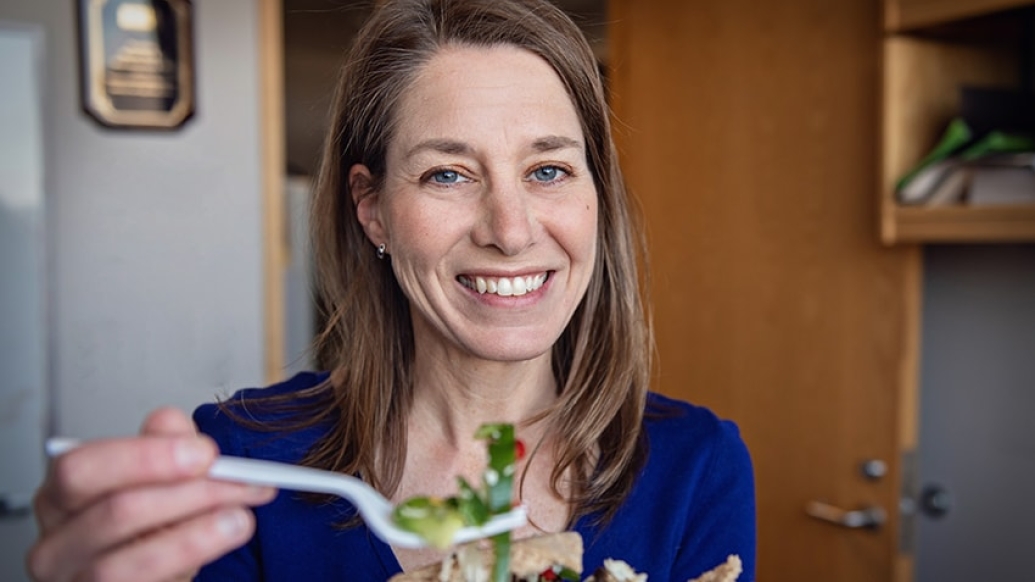Learn what a Michigan Medicine doctor who specializes in heart care eats for breakfast, lunch and dinner — plus a few tips to apply to your own menu.
7:00 AM
Author |

Sharlene Day, M.D., with a healthy lunch from home on a recent work day.
The foods you put in your mouth and stomach affect your heart, too.
That notion is never far from the mind — and menu — of Michigan Medicine cardiologist Sharlene Day, M.D.
MORE FROM MICHIGAN: Sign up for our weekly newsletter
"Some of the things that are less heart-healthy contain a lot of fat and cholesterol; they're also high in calories and sugar," Day says. "This includes many prepared foods."
Such items, consumed regularly, can contribute to arterial plaque buildup, elevated blood pressure and high cholesterol. The foods may also bring on weight gain that causes the body's heart to work harder.
It's why the mother of two serves fresh, home-cooked meals with lean proteins and vegetables whenever possible. (And she isn't opposed to sneaking diced produce into entrees such as meatloaf and stir-fry to make sure the kids get enough servings.)
Even typical indulgences such as pizza can be modified. Whole-wheat dough, low-fat cheese and a do-it-yourself topping bar supply a satisfying alternative when the family cooks together.
"It's a matter of moderation; that's truly the key," says Day. "Don't eat in excess and stay active to avoid a sedentary lifestyle."
Day shared a food diary from her recent workday:
Breakfast: low-fat Greek yogurt, banana, granola with raspberries
Although her family members eat a morning meal at different times on weekdays (she and her husband alternate breakfast duties while the other exercises), Day makes sure they all fill their stomachs.
"You obviously want to start the day with enough calories and protein to have energy to get through your morning — and so you don't overeat later," she says.
SEE ALSO: Fish, Fruit, Healthy Fats: What Heart Disease Patients Should Eat
Here, bananas provide potassium, which helps reduce blood pressure, and raspberries are rich in polyphenols, micronutrients that are associated with a reduced risk of heart disease. The yogurt is packed with protein to help curb appetite. And the low-sugar granola supplies fiber, iron, unsaturated fats and "healthy calories."
Lunch: vegetable lasagna
With her family members active in sports and extracurricular activities, Day doesn't mind serving up starches and carbohydrates for much-needed energy. Cheese, applied lightly, is a blend of part-skim mozzarella and cottage cheese.
Day supplements this dish with layers of zucchini, mushrooms and spinach, the latter of which packs a particularly strong punch. Known to help lower blood pressure, spinach is rich in vitamins and nutrients.
The recent lasagna dinner, repackaged for quick lunchtime leftovers, was a hit: "The kids love it," Day says. "The tray was gone within a few days."
Snack: packaged fruit snacks
The chewy goodies purchased for her children sometimes find their way into Day's own lunch bag.
Such sugared sustenance, while not necessarily nutritious, is "good for a little bit of energy before I run or work out," she notes.
Dinner: homemade poke bowls
The family cooks Asian cuisine once a week — another key opportunity, Day notes, to load up on veggies. Recently, they enjoyed a make-your-own poke (raw fish) bowl with fresh marinated tuna sashimi and sushi rice purchased at the grocery store.
SEE ALSO: How a Cardiac Surgeon Keeps His Own Heart Healthy
A buffet spread of tofu, spinach, broccoli, mushrooms and sugar snap peas allowed everyone to dress their entrees as they wish. "You can add tons of vegetables," Day says.
Beyond that nutritional benefit, the raw tuna offers a substantial boost of omega-3 fatty acids to help reduce inflammation that can cause heart disease. The fatty acid is also known to reduce triglycerides (a type of fat in your blood) and lower blood pressure.
Dessert: sorbet
Day doesn't deny herself a treat on occasion. Although traditional ice cream is a periodic indulgence, frozen yogurt or fresh fruit sorbet is a sensible sweet that can be enjoyed anytime.
"It tastes good, it's not high in fat and not too high in calories," she says.
Photo by Leisa Thompson

Explore a variety of health care news & stories by visiting the Health Lab home page for more articles.

Department of Communication at Michigan Medicine
Want top health & research news weekly? Sign up for Health Lab’s newsletters today!





